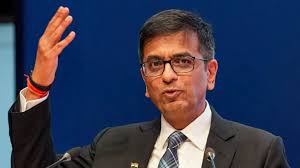NEW DELHI: Former Chief Justice of India DY Chandrachud has defended the Supreme Court’s verdict upholding the abrogation of Article 370 of the Constitution, saying it was a temporary and transitional provision meant to fade away and the verdict had led to the restoration of democracy in Jammu and Kashmir.
In an interview with the BBC Hardtalk programme, Justice Chandrachud said the Supreme Court acknowledged that if the elected government decided to abrogate a provision meant to be transitional, it was acceptable.
“Article 370 of the Constitution, when it was introduced…, was part of a chapter titled ‘transitional arrangements’ or ‘transitional provisions’. It was later renamed as ‘temporary and transitional provisions’, and, therefore, at the birth of the Constitution, the assumption was that what was transitional would have to fade away… Now, is 75 plus years too less for abrogating a transitional provision,” said Justice Chandrachud, who retired as the 50th CJI on November 10, 2024.
The former CJI was responding to the interviewer’s statement that legal scholars felt that the top court’s decision failed to uphold the Constitution.
He, however, said, “Since I was the author of one of the judgments in the case, a judge by his very nature of profession has some restraints on either defending or critiquing his judgments.” Justice Chandrachud said the Supreme Court had set the timeline for the restoration of the democratic process in Jammu and Kashmir.


